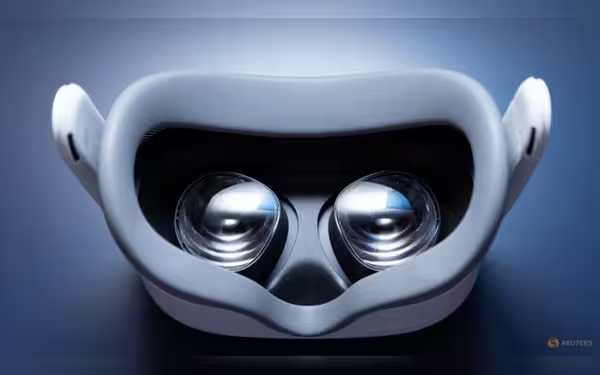Saturday, November 16, 2024 07:46 PM
Meta Launches Orion Augmented-Reality Glasses Prototype
- Meta unveils first prototype of Orion AR glasses.
- Zuckerberg calls glasses a 'time machine' for users.
- Commercial release of AR glasses expected by 2027.
 Image Credits: channelnewsasia
Image Credits: channelnewsasiaMeta introduces Orion AR glasses, aiming for a commercial release by 2027, promising an immersive user experience.
In a significant development in the world of technology, Meta Platforms, the parent company of Facebook, has introduced its first working prototype of augmented-reality glasses, named "Orion." This unveiling took place during the annual Connect conference held in Menlo Park, California. The company aims to merge the virtual world with the real one, creating an immersive experience for users. Chief Executive Mark Zuckerberg described the glasses as a "time machine," emphasizing their potential to transform how we interact with our surroundings.
The Orion glasses are crafted from magnesium alloy and are powered by custom silicon developed by Meta. Users will have the ability to engage with the glasses through various methods, including hand-tracking, voice commands, and a wrist-based neural interface. Zuckerberg expressed optimism about the future of these glasses, stating, "These glasses exist, they are awesome and they are a glimpse of a future that I think is going to be pretty exciting." However, he also acknowledged that the company plans to refine the design to make it smaller, sleeker, and more affordable before launching it to consumers.
Despite the excitement surrounding augmented reality (AR), the journey has not been without challenges. Many AR devices, including Google's Glass, have struggled to gain traction in the market. Zuckerberg has positioned AR technology as a crucial part of Meta's vision for the "metaverse," a concept he first introduced in 2021. However, high development costs and technological hurdles have hindered the delivery of these products.
Analysts, such as Paolo Pescatore from PP Foresight, recognize Meta's ambition to make AR products accessible to a broader audience. Yet, he notes that users remain cautious about artificial intelligence (AI) and may require further convincing to embrace these new technologies. Meta aims to release its first commercial AR glasses to consumers by 2027, anticipating that advancements in technology will reduce production costs by then.
During the conference, Zuckerberg did not directly demonstrate the capabilities of the Orion glasses. Instead, he showcased a video featuring individuals testing the device, which displayed text messages and images. Notably, Jensen Huang, the CEO of Nvidia, was among the testers. Currently, the closest product to the Orion prototype is the Ray-Ban Meta smart glasses, which gained popularity after the addition of an AI assistant last year.
Meta has also announced enhancements to its existing smart glasses, allowing users to scan QR codes and stream music from Spotify using voice commands. Furthermore, the company plans to introduce video-generation capabilities and real-time language translation features later this year. In a live demonstration, Zuckerberg showcased the translation tool, where the glasses translated conversations between English and Spanish.
In addition to the Orion glasses, Meta revealed updates to its AI chatbot, including an audio upgrade that allows the assistant to respond to voice commands and mimic the voices of celebrities like Judi Dench and John Cena. Zuckerberg believes that voice interaction will become a more natural way for users to engage with AI.
Currently, over 400 million people use Meta AI monthly, with 185 million returning weekly. The company has also released new versions of its Llama 3 AI models, although it has withheld these from the European Union due to regulatory concerns. Meta introduced an entry-level version of its Quest mixed-reality headsets, the Quest 3S, priced at $300, while also reducing the price of the Quest 3.
Meta has invested heavily in artificial intelligence, augmented reality, and other metaverse technologies, with capital expenses projected to reach a record high of between $37 billion and $40 billion in 2024. However, the company's metaverse unit, Reality Labs, reported a loss of $8.3 billion in the first half of this year, following a $16 billion loss last year.
As technology continues to evolve, the introduction of products like the Orion glasses signifies a step towards a more integrated virtual and real-world experience. While challenges remain, the potential for augmented reality to reshape our daily lives is immense. As consumers, it is essential to stay informed and open-minded about these advancements, as they may soon become an integral part of our everyday interactions.













